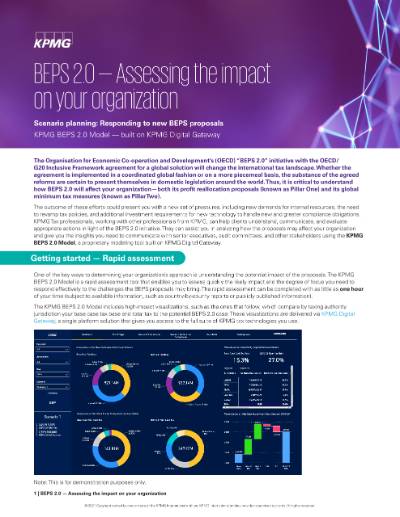The OECD’s ‘BEPS 2.0’ initiative will change the global tax landscape — either because of its success and implementation or its failure and the chaos that would follow. Even if there is no global consensus for BEPS 2.0, much of its substance is likely to live-on through unilateral measures. Thus, it is critical to understand how BEPS 2.0 will affect your organization — both its profit reallocation proposals (known as Pillar One) and its global minimum tax measures (known as Pillar Two). The ultimate outcome of this effort could present a new set of pressures, including new demands for internal resources, revamping tax policies and investing in new technology to handle new compliance obligations.
Our approach:
Understanding the impact of BEPS and the potential organizational responses requires insights of many tax specialties, including diverse areas such as: international tax, to transfer pricing, to restructuring, to policy and lobbying and to tax department process and control design. International tax professionals from across the global organization, help KPMG firm clients understand, communicate, and evaluate appropriate actions in light of the BEPS 2.0 initiative. They can assist you in analyzing how the proposals may affect your organization and give you the insights you need to communicate with senior executives, audit committees and other stakeholders using the KPMG BEPS 2.0 Model, a proprietary modeling tool powered by KPMG Digital Gateway, which integrates the impact of the October 2021 statement from the Inclusive Framework on the Two-Pillar Solution and the Model GloBE Rules released on 20 December 2021.
KPMG Digital Gateway: Powered by Microsoft Azure and built on the cloud, KPMG Digital Gateway is a single platform solution that gives you access to the full suite of KPMG Tax & Legal technologies, all in one place.
How clients can benefit:
Many organizations like to start with a rapid assessment of the implications, and KPMG’s technology based approach allows such an organization, with only several hours of effort, to understand the likely impacts as well as:
- Assess your potential cash tax and potential effective tax rate
- Provide detailed quantitative analysis and summary reports with flexible visualizations
- Support in identifying necessary restructuring work
- Help inform policy advocacy
- Support in developing communication plans for key stakeholders that will help guide your organization's current and future actions
Some or all of the services described herein may not be permissible for KPMG audit clients and their affiliates or related entities.

Subscribe to Future of Tax
Future of Tax updates straight to your inbox.

Key Contact
Rodney Lawrence
Head of Consulting for Strategic Corporates, Tax & Legal, KPMG International

Follow us on LinkedIn
View daily content on our LinkedIn showcase page.










